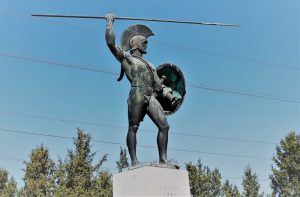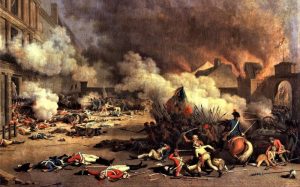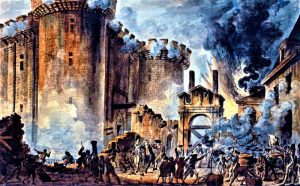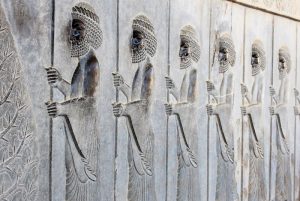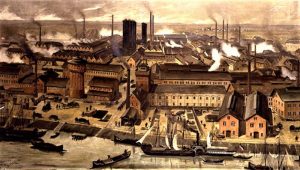Bourbon reforms
The Bourbon reforms were a set of economic and political laws promulgated by the Spanish Crown and under the orders of several kings of the House of Bourbon, mainly in the eighteenth century. The strengthening of the power of the crown with clear lines of authority for functionaries contrasted with the complex system of government that developed under the Habsburg monarchs. In particular, the crown pursued state supremacy over the Catholic Church, resulting in the suppression of the Society of Jesus in 1767, as well as the attempt to abolish ecclesiastical privilege.

- When was it: During the 18th century
- Where was it: Viceroyalty of New Spain
What were the Bourbon reforms?
They were a series of changes in the administration applied by the members of the Bourbon monarchy who sought to change the internal situation of the peninsula and its relations with the overseas provinces in order to create a new idea of the State by assuming the direction of Spanish power.
About the Bourbon reforms
The Bourbon reforms consisted of a series of changes that were introduced by the monarchs of the Bourbon dynasty of the Spanish Crown during the 18th century, and that focused on economic, political and administrative matters, which were applied in the peninsular territory and in its overseas possessions both for the metropolis and for all its colonies. Reforms began with Philip V, continued with Ferdinand VI and were developed by Charles III.
What were the main Bourbon reforms?
The main Bourbon reforms that emerged were the following:
At the military level, it was planned to create a strong army to avoid depending on other powers. War expenses were high, and the army had a higher hierarchy.
Renewal of the bureaucracy to achieve a professional bureaucracy naming military and civilians, which were evaluated periodically. A fixed salary was established instead of bonuses.
The figure of the Mayor was a key piece to represent the new order and the mayors were applied throughout Spain and America to improve the control of tax collection. The mayors had the responsibility of collecting taxes and directing the army and economy of the region.
Increase in tax collection by the treasury through a professional and salaried bureaucracy, which allowed for an increase in tax revenues, raising the economy of the crown. The mining industry and exports were improved.
The reactivation of silver mining that managed to overcome the depression through new discoveries, fiscal incentives and credits.
The power of the church was greater and complete obedience was demanded. Ecclesiastical matters were under the orders of the king and some were eliminated clerical strengthening the control of the tithe.
The expulsion of the Jesuits by order of Charles III showed the strong imposition of the crown within the church.
Characteristics
The main characteristics of the Bourbon reforms were:
- They sought to have control over the American colonies.
- The crown obtained resources through exploitation.
- The prohibitions for the natives were accentuated and they could not participate in political or ecclesiastical commands.
- The army was professionalized.
- New Spain was divided into mayors.
- The viceroy’s political power was diminished.
Causes
Bourbon reforms emerged as a need to free trade and open new ports to improve foreign trade. It was sought to promote the extraction and processing of silver by establishing the college of mining and the court of mines. Another of the causes was the expulsion of the Jesuits from the territories of the Spanish empire since they were considered disobedient before the empire.
Objectives of the Bourbon reforms
The objectives of the Bourbon reforms were as follows:
- To recover Spain’s world hegemony.
- To optimize all the profits that the colonies had.
- Consolidate the absolute power of the king to subdue the Creole groups.
- Make improvements in the administration of the colonies to increase the collection of taxes.
- Neutralize and eliminate the power that the criollos
- Impose the power of the Catholic Church.
- End the power of the mayors and reduce the power of the viceroy of Peru.
- Encourage Spanish industry and commerce.
Consequences
Bourbon economic reforms succeeded in increasing production, trade and real incomes, while undermining the sense of loyalty and fidelity of the elite and Creole subordinates to the Crown. It was possible to increase production in mining and agriculture in general, with the creation of more onerous regimes of production and labor for settlers and slaves.
An administrative reform was created in the 1760s by creating a new bureaucracy called the Intendencies, which was a kind of regional government in charge of controlling tax collection, directing troops and boosting the regional economy.
The number of soldiers and the number of officers in charge, who were career professionals and Spanish peninsular, increased. The military reforms failed to strengthen the ties between Spain and the American colonies, as the Creoles ended up playing a significant role in the independence revolution in Latin America.
Advantages
Among the advantages that were achieved with the reforms are:
- Trade was liberalized and new trading ports were opened.
- The extraction and processing of silver was boosted.
- The Jesuits were expelled.
- Spain became the first producer and exporter of silver in the world.
- The economy of the crown was increased.
Disadvantages
Among the main disadvantages we mention:
- The ability to accumulate gold and silver was lost.
- The town councils lost their power and were replaced by Spaniards.
- New taxes were created for the American population.
- There was discontent of the Hispanic Americans and they demonstrated it with wars and rebellions against Spain.
Protagonists of the Bourbon reforms
The main protagonists of the inclusion of the Bourbon reforms were the Bourbon monarchs of the Spanish Crown, Philip V, Ferdinand VI and, mainly, Charles III.
Importance
Its importance lies in the fact that it affected the economy, politics and administration in the Latin American regions, but increased the economy of the Spanish crown. They sought to increase the income of the crown through taxes, recover the power of the crown over America and implement the viceroyalty.
How to cite this article?
Briceño V., Gabriela. (2019). Bourbon reforms. Recovered on 3 January, 2025, de Euston96: https://www.euston96.com/en/bourbon-reforms/



